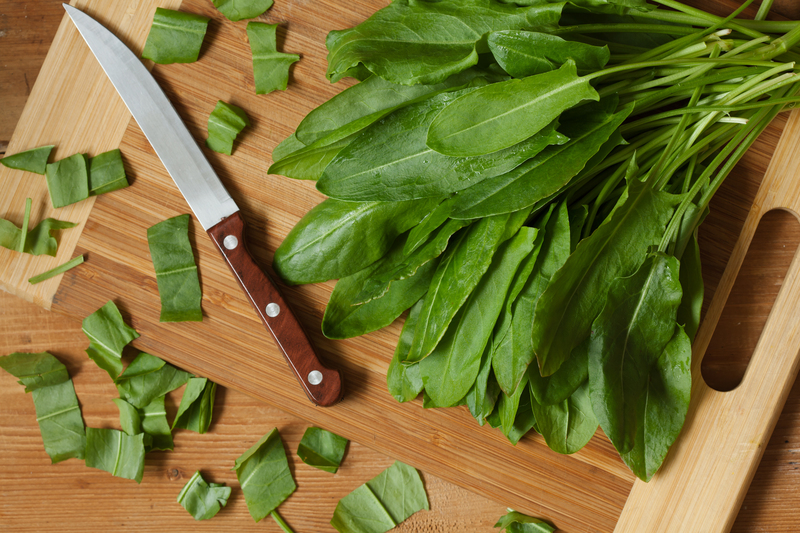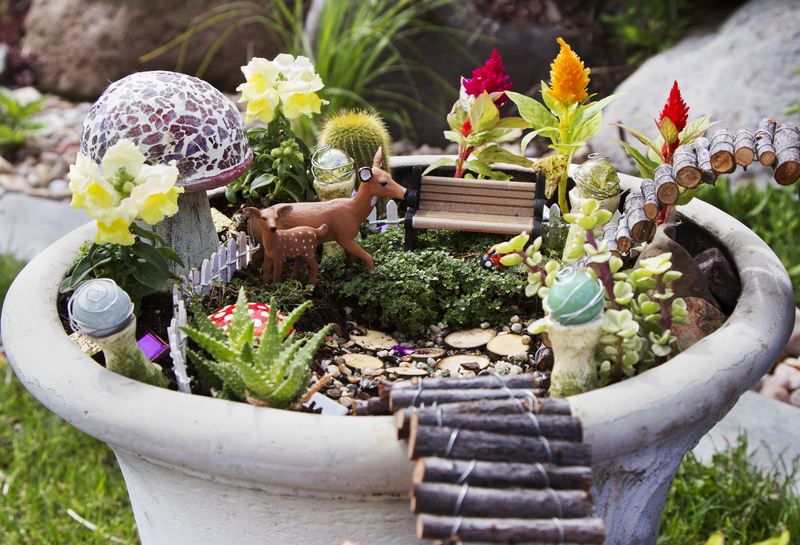Embark on a Gardening Journey with 9 Expert Tips for Starters
Posted on 18/09/2025
Embark on a Gardening Journey with 9 Expert Tips for Starters
Are you ready to embark on a gardening journey? Starting a garden is a rewarding experience that connects you with nature and brings vibrant life to your outdoor space. Whether you have a sprawling backyard or just a small balcony, gardening offers endless satisfaction and numerous health benefits. In this comprehensive guide, we reveal 9 expert tips for gardening starters that will help you create a flourishing and beautiful garden--no matter your experience level.
Why Begin a Gardening Journey?
Before diving into our expert advice, let's explore why so many people are getting involved in gardening. Gardening is more than just planting seeds--it's a journey of nurturing, patience, and enjoyment. Studies show that gardening reduces stress, boosts mood, and supplies your table with fresh, healthy produce or gorgeous flowers.
- Connection with Nature: Gardening helps you unplug and de-stress.
- Promotes Healthy Living: Grow your own fruits, vegetables, and herbs for fresh meals.
- Enhances Curb Appeal: A well-maintained garden beautifies your home's exterior.

9 Expert Tips for Starters: Your Path to Gardening Success
Ready to start your gardening adventure? These expert gardening tips for beginners are carefully curated to ensure you avoid common pitfalls and enjoy maximum success. Let's get growing!
1. Choose the Right Location
The foundation of all successful gardening starts with choosing the best possible location. Analyze your available space for sunlight, shade, and shelter from harsh winds. Most vegetables and annual flowers require at least 6 hours of sunlight daily, while many shade plants can thrive in less sunny spots.
- Observe your space throughout the day and note areas with consistent sun and shade.
- Consider the proximity to a water source for easy irrigation.
- Choose a level area to prevent erosion and runoff.
2. Start with Easy-to-Grow Plants
Don't overwhelm yourself at the start! Opt for beginner-friendly plants like marigolds, zinnias, lettuce, radishes, and cherry tomatoes. These are hardy, fast-growing, and forgiving of beginners' mistakes.
- Herbs like basil, mint, and chives are great for kitchen gardens and easy to maintain.
- Read seed packets or plant labels for information on sunlight, spacing, and care.
3. Test and Prepare Your Soil
The health of your plants begins beneath the surface. Quality soil is the lifeblood of any successful garden journey. Perform a simple soil test using kits from garden centers or your local cooperative extension. This helps you determine if your soil is acidic, alkaline, or neutral and whether it has the nutrients your plants will need.
- Amend your soil with compost or organic matter to improve fertility and drainage.
- Avoid compacted soil, which prevents root growth and water absorption.
4. Plan Your Garden Layout
Layout matters! Sketch a basic plan for your garden before planting. Group plants with similar needs together--such as full-sun and drought-tolerant varieties. Leave enough space between plants for airflow, sunlight, and easy maintenance.
- Rotate crops each year to prevent nutrient depletion and pest cycles.
- Consider raised beds or container gardening if space is limited or soil is poor.
5. Learn Proper Watering Techniques
One of the most critical gardening tips for beginners is correct watering. Over-watering and under-watering are two of the most common mistakes. Early morning is an ideal time for watering, reducing loss to evaporation and preventing diseases.
- Check soil moisture before watering by sticking your finger about an inch deep; if it's dry, water.
- Water the base of plants rather than their leaves to minimize disease risk.
- Invest in a soaker hose or drip irrigation system for efficiency.
6. Feed Your Plants the Right Way
Nutrients are essential for lush, thriving plants. Start with organic matter like compost or aged manure to give plants a boost. Balanced fertilizers with key nutrients--nitrogen, phosphorus, and potassium--can help bridge any gaps.
- Follow package instructions to avoid over-fertilizing, which can harm plants.
- Use slow-release options for steady feeding.
- Tip: Make your own compost to recycle kitchen scraps and yard waste!
7. Watch for Pests and Diseases
A thriving garden can sometimes attract unwanted guests. Learn to identify common garden pests such as aphids, caterpillars, and slugs. Regular inspection helps you catch any problems early.
- Encourage beneficial insects like ladybugs and lacewings.
- Use natural remedies--like a strong spray of water or insecticidal soap--before reaching for harsh chemicals.
- Rotate crops and clean up plant debris to reduce disease risks.
8. Mulch to Retain Moisture and Prevent Weeds
Mulching is a gardener's secret weapon. A 2-3 inch layer of mulch around your plants conserves soil moisture, suppresses weeds, and regulates soil temperature during hot or cold spells.
- Organic mulches (wood chips, straw, shredded leaves) add nutrients as they break down.
- Avoid piling mulch against plant stems to prevent rot.
9. Document and Learn from Your Garden Journey
Every gardening journey is unique. Keeping notes and photos helps you see what works and what doesn't in your growing environment. Log planting dates, variety names, weather patterns, fertilization schedules, and any pests or diseases you encounter.
- Start a gardening journal or use smartphone apps for easy record-keeping.
- Join online forums or local gardening groups to share experiences and gain insights.
Essential Tools and Resources for Gardening Starters
To nurture your beginner's garden, it's wise to invest in essential gardening tools that ease the process and enhance your results. Here's what you'll need to get started:
- Hand Trowel: For digging small holes and transplanting.
- Pruning Shears: To trim dead leaves and encourage healthy growth.
- Watering Can or Hose: Essential for proper hydration.
- Garden Gloves: Protect your hands from thorns and dirt.
- Rake and Spade: To prepare and maintain soil beds.
- Garden Fork: For loosening and aerating soil.
Many garden centers and hardware stores offer starter kits, making it easy to assemble your toolkit. Quality tools are an investment that can last for years.
Common Mistakes Beginners Should Avoid
While embarking on your gardening adventure, it's natural to make a few missteps. However, being aware of common mistakes can set you ahead:
- Planting too densely: Overcrowding stunts growth and encourages disease.
- Poor soil preparation: Plants struggle without nutrient-rich, well-drained soil.
- Overwatering or under-watering: Leads to root rot or dehydration.
- Ignoring local climate: Choose plants suited for your region's temperature and precipitation.
- Neglecting plant labels: Don't forget to check care requirements!
Maximize Your Success: Additional Gardening Tips for Starters
Beyond the main tips above, keep these extra pieces of advice in mind as you develop your green thumb:
- Be patient--gardens take time to establish and mature.
- Start small to avoid feeling overwhelmed; you can expand later.
- Stay consistent with weeding, watering, and observation.
- Celebrate your successes--whether it's your first tomato or a bed of colorful blooms!

Frequently Asked Questions for Gardening Beginners
What if I only have a balcony or small space?
Great gardens can be grown anywhere! Container gardening or vertical gardens are ideal for small spaces. Use pots, hanging baskets, and trellises to maximize your growing area.
When is the best time to start a garden?
Most gardens are started in spring after the risk of frost has passed. However, you can plant cool-season crops in fall or begin an indoor herb garden year-round.
How do I know when to harvest?
Seed packets and plant tags provide estimates for days until harvest. Observe the color, size, and feel of fruits or vegetables, and refer to expert gardening resources for detailed guides.
Are there easy plants for absolute beginners?
Yes! Start with lettuce, radishes, zucchini, sunflowers, and marigolds before advancing to more challenging plants.
Begin Your Gardening Journey Today!
There has never been a better time to embark on your gardening journey. With these 9 expert tips for starters, you can cultivate a garden that delights your senses, nourishes your family, and provides year-round joy. Remember to start simple, learn from every season, and enjoy the process of watching your garden grow--one seed, one bloom, and one harvest at a time.
Ready to take root and watch your gardening skills blossom? With determination, the right knowledge, and a dash of patience, your gardening journey will be both fun and fruitful!
If you found this guide to gardening for starters useful, share it with family or friends who might benefit, and don't hesitate to join online gardening communities to keep growing your skills!

